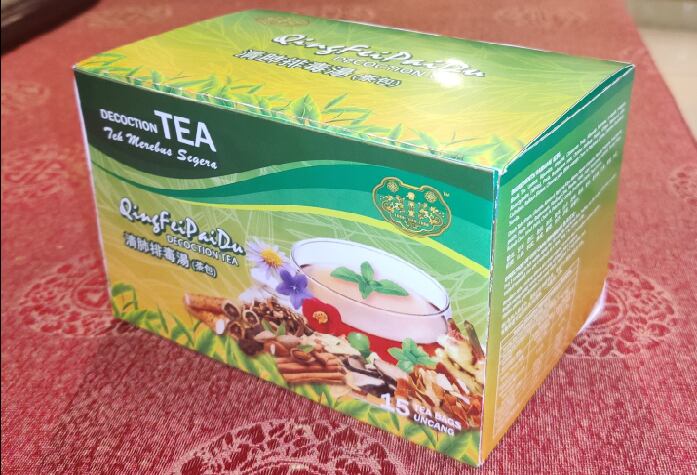The Hong Kong stock exchange listed company said its product, Tang Yuan Tang – a decoction teabag – is developed based on the Qingfei Paidu decoction approved by China authorities as a COVID-19 treatment.
The product is available for sale in supermarkets, online channels, organic products stores, and also marketed via KOL in Dec 2020. A box of 15 teabags is sold at RM$39.50 (US$9.75).
The company also sells the product to businesses that are looking to provide the teabags for their employees.
The China authorities have approved a number of TCM products, known as the “three formulas, three medicines”, as part of its standard therapy for COVID-19.
The Qingfei Paidu decoction soup is one of the “three formulas”, which could be used on patients with severe symptoms, alongside Huashi Baidu, and Xuanfei Baidu.
The “three medicines” include Lianhua Qingwen capsule, Qinghua Qinggan granules, and Xuebijing injection.
The Qingfei Paidu decoction teabag launched by Ritamix consists of 22 kinds of herbal ingredients.
Speaking to NutraIngredients-Asia, Howard Lee, executive director at Ritamix Global, said the company’s R&D team has been in talks with TCM experts since February in formulating the decoction teabag.
“The [formula of the] decoction tea was originated from China; it is a combination of six herbal formulas from the Eastern Han dynasty.
“The six formulas are separately invented by the ‘saint of Chinese medical doctors’ in the Eastern Han dynasty, known as Zhang Zhong Jing,” he said.
A teabag could provide ease of consumption, at the same time, some of the highly potent ingredients used in the Qingfei Paidu decoction soup has been replaced in this product.
For instance, mahuang (Ephedra sinica) and shegan (Blackberrylily Rhizome) have been replaced with fuping (lemna minor) and jingjie (Schizonepeta tenuifolia).
Lee explained that the purpose of the teabag was for health support in the long term. Mahuang and shegan are thus replaced since they are not recommended for long-term consumption as they are highly potent.
The R&D team also worked on the product taste so as to suit the palette of the multi-racial population in Malaysia.
The product is currently registered as a food and beverage in Malaysia and no health claim is made on the product.
Lee said after passing eight months of market monitoring, the product could be approved as a medication tea and that there were plans to distribute the teabags to overseas markets.
For instance, the company has been working on product registration in Australia, India, and the US.
Health focus
Aside from the decoction teabag, Ritamix Global earlier also announced the that it was developing a new nicotinamide mononucleotide (NMN) product for sale in China.
This will be undertaken by the firm’s subsidiary, Kevon, which is involved in the distribution of human food ingredients.
Fellow Malaysia enterprise Bioalpha International is the partner for manufacturing and supplying of the NMN supplements in China and South East Asia markets.
Bioalpha and Ritamix Global will also cooperate with the Universiti Teknologi Malaysia to conduct research on health supplement products based on NMN.
The NMN product is expected to reach the Malaysian market in early 2021, Ritamix Global said in an announcement made on the Hong Kong Exchange.
According to Lee, the NMN and Qingfei Paidu decoction teabag are the first two consumer health products launched by the company.
More on Qingfei Paidu
The Qingfei Paidu formula approved by the China authorities has been studied in a number of human clinical trials.
One of the findings published on Biomedicine and Pharmacotherapy found that the combination of the formula with Western medicine had demonstrated significant anti-inflammatory effects, when compared to patients who took only Western medicine.
The trial involved 63 patients over a two-week period.
The combined treatment also tended to mitigate the extent of multi-organ impairment. However, neither mortality nor length of hospitalization was affected.
Another study said Qingfei Paidu acted on COVID-19 via anti-viral, anti-inflammatory, and metabolic programming.


